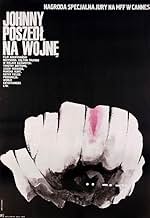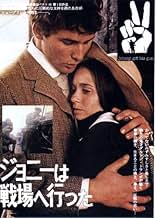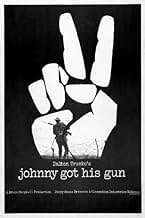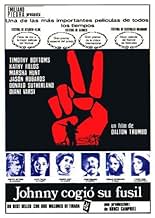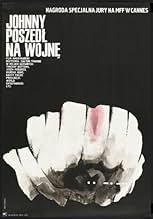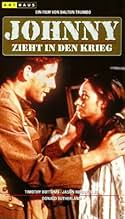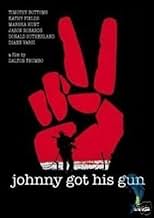IMDb RATING
7.8/10
19K
YOUR RATING
During World War I, a patriotic young American is rendered blind, deaf, limbless, and mute by a horrific artillery shell attack. Trapped in what's left of his body, he desperately looks for ... Read allDuring World War I, a patriotic young American is rendered blind, deaf, limbless, and mute by a horrific artillery shell attack. Trapped in what's left of his body, he desperately looks for a way to end his life.During World War I, a patriotic young American is rendered blind, deaf, limbless, and mute by a horrific artillery shell attack. Trapped in what's left of his body, he desperately looks for a way to end his life.
- Awards
- 4 wins & 3 nominations total
Don 'Red' Barry
- Jody Simmons
- (as Donald Barry)
Dalton Trumbo
- Orator
- (as Robert Cole)
Featured reviews
10jdadmun
I became an instant pacifist when I saw this movie at the age of 16. Prior to this, I had been a supporter of the war in Vietnam, and had fully intended to enlist when I was old enough. My father, a veteran of WW2 and Korea, took me to see this movie when it was first released, to help cure me of my delusion about the glory of war. He was very successful in that undertaking. While I haven't seen the movie in 34 years, I cannot deny it had a major influence on my life. I'll never forget the horror I felt in seeing that poor soldier trapped in his mind. I would strongly recommend telling anyone who is pro-war to see this movie. You may help turn on others to the horrors of war.
I saw this movie on public Greek TV (original version with subtitles), and was glued to the screen until the very end. I would say that it develops in three modes. One is the horrible black and white present, one is the colorful past (memory) and one is the surreal world of Johnny's dreams where he is conscious of his injury! I haven't understood how the scenes with his father in the past add up to the movie very well. The acting isn't superb and some lines could have been different. The black and white cinematography is very convincing and the scenes with the last nurse are tremendous! Aside from the downsides of war which are evident, the movie also deals with how the system is willing to suppress its own fabricated heroes when they fall short of its ideology. One of the best Hollywood movies ever made, chiefly due to its powerful script. 8/10
One of cinema's greatest achievements. The film is an incredible experience. The fact that you spend almost two hours watching the figure of someone buried under sheets and that we are intrigued by every second of it, testifies to the genius of the film. It's sad that most people remember this movie as the one Metallica made a video for. No offense to the band, but this JGHG is far more important than that. Dalton Trumbo's only directorial effort and it is flawless. The majority of the film is told in a voiceover and like "Twelve Angry Men" every thing takes place in one room. Prepare to be amazed.
10gvf
...since a film has actually moved me quite like this. I had read about half of Dalton Trumbo's original novel before seeing the film. The book is sort of difficult to read, but the movie is one big revelation. It may be because Dalton Trumbo wrote the screenplay for it and directed his own original brainchild that this film is so incredibly dense and gripping.
Much has been said about the plot and storyline, so I won't get on that here. The bottom line is, this movie is as original and authentic today as in 1971 when it was made (Vietnam war era, no less!), or even as in 1939 (at the eve of WW II!), the year the novel first appeared on bookshelves. A timeless classic if there ever was one, and a glowing testimony to the eternal insanity of war. Oftentimes subtle and subversive, its dialogs fully expose the madness of the whole concept of it. But it doesn't stop there, the film also examines the conflict between religion and war and the absurdity that ensues from justifying bloodshed through creed.
I could go on forever trying to explain here why this movie is such a masterpiece to me, but maybe it's enough to tell whoever will read this to go buy the DVD. Like I said, it's a timeless anti-war classic that's worth every cent.
Much has been said about the plot and storyline, so I won't get on that here. The bottom line is, this movie is as original and authentic today as in 1971 when it was made (Vietnam war era, no less!), or even as in 1939 (at the eve of WW II!), the year the novel first appeared on bookshelves. A timeless classic if there ever was one, and a glowing testimony to the eternal insanity of war. Oftentimes subtle and subversive, its dialogs fully expose the madness of the whole concept of it. But it doesn't stop there, the film also examines the conflict between religion and war and the absurdity that ensues from justifying bloodshed through creed.
I could go on forever trying to explain here why this movie is such a masterpiece to me, but maybe it's enough to tell whoever will read this to go buy the DVD. Like I said, it's a timeless anti-war classic that's worth every cent.
Johnny Got His Gun is a motion picture based on a 1938 anti-war book that used World War I as the setting. It should be noted that Dalton Trumbo (1905-1976), author of the book and director of the movie was a brilliant Hollywood screenwriter who also wrote the scripts for several Academy Award winning movies such as Exodus, Roman Holiday, Spartacus and The Brave One. He was one of the big 10 blacklisted in the 1940s by Hollywood and essentially forced to move to Mexico. He had joined the Communist party in 1943, thinking that it was all about caring for fellow human beings and ensuring that working people are paid fairly rather than being turned into semi-slaves. He was not terribly interested in the political agenda of the American Communist Party and dropped it in the mid 1940s to instead put his efforts into unionization. However, during the McCarthy era, the fact that he really had little to do with communism didn't matter. He was targeted by McCarthy, and imprisoned for a year for standing on his 5th Amendment rights by refusing to testify before McCarthy's committee. One must wonder if this book had something to do with why he was targeted in that immediate post WWII, rabidly pro-war and anti-communist culture.
This film is graced by several stars and minor players who were relative unknowns in 1971 when the film was released. They included not only Southerland, but also Timothy Bottoms, Tom Tryon, and David Soul. Additionally, some pretty well known actors such as Alice Nunn, Marsha Hunt, and Jason Robards had parts in the film. These excellent actors brought their considerable skills to what was essentially a low-budget anti-war film made and released during the Vietnam war. Strangely (at least to me), the movie wasn't a hit with the anti-war crowd during the very early 1970s--perhaps because the depiction of the terrible injuries suffered by the protagonist were just too real to those threatened with being drafted.
This is clearly an anti-war film because it shows the horror of war in the person of Johnny Bonham, a soldier whose body was blown apart by an explosive. All Johnny was left with was a horribly damaged body--essentially just a head and torso. He was left with none of the physical senses humans use to communicating with other people no eyes, ears or tongue. In the normal course of events, doctors would have let him die of his horrific injuries. However, in this case they used him as an experiment to see how well/long they could keep an essentially "dead" body alive. The doctors assumed his injuries were such that he had no consciousness and no ability to suffer. How wrong they were! In a surrealistic format, the film goes back and forth from a black and white present, to a color past showing Johnny's memories, and back to the present in which Johnny has discussions with Jesus Christ (played by a young Donald Southerland).
To this viewer, it was the beauty of human compassion demonstrated first by a nurse supervisor and later by the young nurse who cared for Johnny that resonated. When we first see Johnny as a patient, he is "stored" in what looks like some kind of utility room, with no light, no air, and no human contact other than the minimum necessary to provide physical care. The nursing supervisor (sort of a battle-Axel type) comes in and demands that the window be opened so he can have the light and sun on his face and some fresh air. When the other nurses start to protest that he won't feel these things, she shuts them up with a words to the effect that she would not stand for treating any patient with less than excellent nursing care. (Being a nurse myself, I recognized immediately the nursing standards she was demanding although her words would probably not be understood in that context by a non-nurse). That brusk nurse supervisor's demand that even this terribly disabled person be treated with respect and concern was a tiny, but powerful scene in the movie, because it communicated the essential worth of all people, no matter their station or condition.
Later young nurse gives Johnny sensitive and kind care to, even though she has no idea that he has any mental awareness. The brilliance of her caring for even this, the least of patients, shows what human beneficence should be in this world. And it showed especially what being a nurse should mean. To me, the many shades and colors of human feeling for other people, and the importance of human caring--even under the most drastic of circumstances, was a key element of this film. To that extent, the message of about how humans should and should not view and interact with each other was even more powerful than the anti-war message.
I would recommend that anyone who can see this film treat themselves to a truly amazing experience. I've only seen it twice, and saw much more in the film the second time than I saw the first time. My guess is that if I obtain the DVD and see it several more times, additional layers of meaning will emerge. The film is that deep and that complex in its many forms and shades of meaning.
This film is graced by several stars and minor players who were relative unknowns in 1971 when the film was released. They included not only Southerland, but also Timothy Bottoms, Tom Tryon, and David Soul. Additionally, some pretty well known actors such as Alice Nunn, Marsha Hunt, and Jason Robards had parts in the film. These excellent actors brought their considerable skills to what was essentially a low-budget anti-war film made and released during the Vietnam war. Strangely (at least to me), the movie wasn't a hit with the anti-war crowd during the very early 1970s--perhaps because the depiction of the terrible injuries suffered by the protagonist were just too real to those threatened with being drafted.
This is clearly an anti-war film because it shows the horror of war in the person of Johnny Bonham, a soldier whose body was blown apart by an explosive. All Johnny was left with was a horribly damaged body--essentially just a head and torso. He was left with none of the physical senses humans use to communicating with other people no eyes, ears or tongue. In the normal course of events, doctors would have let him die of his horrific injuries. However, in this case they used him as an experiment to see how well/long they could keep an essentially "dead" body alive. The doctors assumed his injuries were such that he had no consciousness and no ability to suffer. How wrong they were! In a surrealistic format, the film goes back and forth from a black and white present, to a color past showing Johnny's memories, and back to the present in which Johnny has discussions with Jesus Christ (played by a young Donald Southerland).
To this viewer, it was the beauty of human compassion demonstrated first by a nurse supervisor and later by the young nurse who cared for Johnny that resonated. When we first see Johnny as a patient, he is "stored" in what looks like some kind of utility room, with no light, no air, and no human contact other than the minimum necessary to provide physical care. The nursing supervisor (sort of a battle-Axel type) comes in and demands that the window be opened so he can have the light and sun on his face and some fresh air. When the other nurses start to protest that he won't feel these things, she shuts them up with a words to the effect that she would not stand for treating any patient with less than excellent nursing care. (Being a nurse myself, I recognized immediately the nursing standards she was demanding although her words would probably not be understood in that context by a non-nurse). That brusk nurse supervisor's demand that even this terribly disabled person be treated with respect and concern was a tiny, but powerful scene in the movie, because it communicated the essential worth of all people, no matter their station or condition.
Later young nurse gives Johnny sensitive and kind care to, even though she has no idea that he has any mental awareness. The brilliance of her caring for even this, the least of patients, shows what human beneficence should be in this world. And it showed especially what being a nurse should mean. To me, the many shades and colors of human feeling for other people, and the importance of human caring--even under the most drastic of circumstances, was a key element of this film. To that extent, the message of about how humans should and should not view and interact with each other was even more powerful than the anti-war message.
I would recommend that anyone who can see this film treat themselves to a truly amazing experience. I've only seen it twice, and saw much more in the film the second time than I saw the first time. My guess is that if I obtain the DVD and see it several more times, additional layers of meaning will emerge. The film is that deep and that complex in its many forms and shades of meaning.
Did you know
- TriviaThe film was a minor success when it was originally released. It became a well-known cult film in 1989 when it was included in the Metallica video "One" (1989). Eventually, the band bought the rights to the film so they could keep showing their music video (and using clips in live performances) without having to pay royalties.
- Crazy creditsWar Dead Since 1914: Over 80,000,000 Missing or Mutilated: Over 150,000,000 "Dulce et decorum est pro patria mori"
- Alternate versionsOn the Laserdisc version the scene where Joe gets the phone call about his fathers death is extended after his boss walks up to him and Joe explains his situation, afterward his boss gets another worker to drive him home.
- ConnectionsEdited into Metallica: One (1989)
Details
- Release date
- Country of origin
- Language
- Also known as
- Johnny Got His Gun
- Filming locations
- El Mirage Dry Lake, California, USA(carnival barker scenes)
- Production company
- See more company credits at IMDbPro
Box office
- Budget
- $1,000,000 (estimated)
- Gross worldwide
- $2,735
- Runtime
- 1h 51m(111 min)
- Color
- Aspect ratio
- 1.66 : 1
Contribute to this page
Suggest an edit or add missing content


